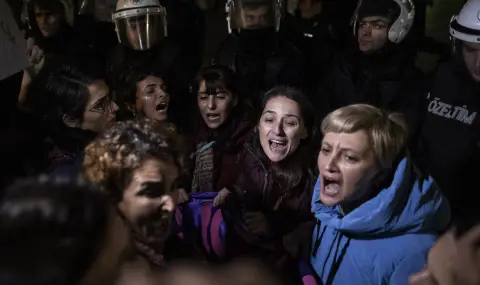On this sunny autumn day, around 300 young women have gathered in Istanbul's Kadıköy kural on the Anatolian side of the Bosphorus. They are here to protest against violence against women and girls. The demonstration was organized by the Federation of Young Feminists after a series of brutal murders.
"Crimes are getting more brutal"
On October 4, a 19-year-old man stabbed and beheaded two young women in Istanbul. He committed the second murder on the Theodosian Wall, and then committed suicide in front of numerous passers-by.
A week earlier, a young policewoman was killed during a police operation. After a schoolgirl went missing for several weeks in August, her body was found by a river in Southeastern Anatolia.
"Violence against women is not new, but it is taking on new dimensions," says lawyer Esin Izel Uysal. "Crimes are becoming more brutal, and the victims and perpetrators are getting younger."
Most perpetrators are partners or family members
In the first nine months of this year, the platform "Stop the killing of women", of which Uysal is a part, registered 295 murders of women and 184 suspicious deaths. Cases in which, for example, women fell from a balcony or allegedly committed suicide without a specific reason being known, are considered suspicious.
The number of suspicious deaths has increased by 82% in the period between 2017 and 2023, explains Uysal in an interview for DV. Violence usually takes place at home, but increasingly also on the street. In most cases, the perpetrators are partners, ex-partners or family members. This year, 65% of perpetrators said they killed women because they wanted to separate or because they refused to marry them.
Young feminists who take to the streets blame the violence on the patriarchal system that prevents equality between men and women. They say the government is partly to blame for the escalation because of its Islamic-conservative policies on the family and women. The pro-government Islamist Brotherhood and ruling coalition parties around Erdogan have repeatedly called for the repeal of existing laws protecting women and for a time limit on alimony payments after divorce.
Under pressure from these groups, Turkey withdrew from the Istanbul Convention in 2021. Ankara justified the move by claiming that the Council of Europe Convention promotes homosexuality and threatens traditional family values.
According to President Erdoğan, current laws provide sufficient protection for women even without the Istanbul Convention. As a result of the unrelenting criticism, he announced last week that the penalties would be toughened after all.
Political prisoners are given priority
Many human rights activists believe that the problem is not in the criminal code, but in its implementation. They criticize the government for focusing its prosecution efforts specifically on opposition members rather than dangerous criminals after the 2016 coup attempt. Prisons are overcrowded with political prisoners who have been convicted of alleged membership in a terrorist organization or terrorist propaganda. Some have been held in custody for years without trial.
In order to make room in overcrowded prisons, Ankara has changed the law on the execution of sentences several times in recent years. Many perpetrators of violent crimes are released quickly. During the coronavirus pandemic, the government released almost 100,000 prisoners due to the risk of infection - excluding political prisoners. For a large part of society, this practice means impunity.
For example, an ex-policeman kidnapped his ex-girlfriend and tortured her for days, finally letting her go with the warning that if he couldn't have her, no one else could. The 51-year-old man was sentenced to two years and six months in prison. After only two months, however, he was released on parole. At the beginning of this year, the man again threatened the woman, who posted a call for help on social networks. But her ex-boyfriend managed to take down the post because it violated his privacy.
Such impunity further encourages men to commit violence against women, says women's rights activist Yusal. "They know that in a few days or months they will be free again,", she emphasizes.
Author: Elmaz Topchu
